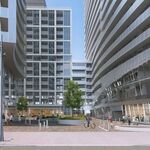I personally have two concerns that I don't think will ever be addressed.
1. What are the majority of cycling trips expected to accomplish?
I think if you're reasonably close to the core, and work there commuting is a realistic prospect. I think if either you don't live there OR your place of work is further away you've significantly cut the number of people willing to commute that far by bike. Bike use in the winter is 20% of summer volumes, and I think comfort is the #1 issue, probably even above safety.
If someone is in the suburbs, are we expecting people to commute to downtown OR are we expecting them to replace local car trips with bike trips? (ex, groceries) If there isn't anything nearby to bike to I feel like the lanes will stay empty.
2. What does success look like?
The city has refused to define a successful bike lane, in every other form of transport the key metric is passengers per hour. The closest thing I've seen is "lives saved" but we don't use that justification for anything else. Otherwise we'd cut highway speed limits etc.
Sorry. In a bit of a rush, pulling on goalie equipment for some of our favorite sport, but quickly… and yes, I did come by an ICE powered vehicle. I have not mastered towing or throwing my equipment on my 10 spd.
1. I do not think it is all about commuting, although that’s a large part of it. If we are talking neighbourhoods and connected neighbourhoods, then we are speaking of a realm of destinations and reasons for biking. And not forgetting more connectivity amongst transit options as well, transit options with priority over cars - at intersections and separated from traffic. Biking does not stand alone as I see it, but is part of the options available depending on destination. And I do not discount the car, just its place in the hierarchy and priority sequence.
2. I think your second point is very valid. I spend a lot of time in Montreal in all seasons and bike use in the winter does drop, but it does not disappear. How many truly snowy days are there in Toronto.? And again, I think the success of bike lanes is also part of the success of neighborhoods, so pedestrians, street scapes, transit etc - not the arterial highways that many of our arteries are - such as the race to get to the bottom of University Ave.
This is more than just about bikes. I think we are speaking of a cultural shift as well underlying all. Perhaps Jane Jacob’s started it, David Crombie excited it, and the Urbanization of Toronto continued, and then exploded with condominium and shifts in family makeup, cultural make up etc.
Is this a cookie cutter plan to apply to all. I don’t think so, but I think municipalities, not Doug Ford, should be making those decisions. If Doug wants to be mayor, he should run.
Hockey calls. Cheers!






